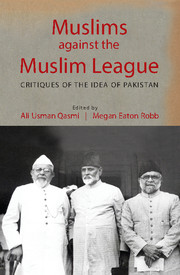Book contents
- Frontmatter
- Contents
- Acknowledgements
- Introduction
- 1 Maulana Husain Ahmad Madani and the Jami'at ‘Ulama-i- Hind: Against Pakistan, against the Muslim League
- 2 The Partition Conundrum: Perspectives, Experiences and Ambiguities from qasbahs in India
- 3 Choudhary Rahmat Ali and his Political Imagination: Pak Plan and the Continent of Dinia
- 4 Differentiating between Pakistan and Napak-istan: Maulana Abul Ala Maududi's Critique of the Muslim League and Muhammad Ali Jinnah
- 5 Advising the Army of Allah: Ashraf Ali Thanawi's Critique of the Muslim League
- 6 The Illusory Promise of Freedom: Mian Iftikhar-ud-Din and the Movement for Pakistan
- 7 Visionary of Another Politics: Inayatullah Khan ‘al-Mashriqi’ and Pakistan
- 8 Nonviolence, Pukhtunwali and Decolonization: Abdul Ghaffar Khan and the Khuda'i Khidmatgar Politics of Friendship
- 9 Islam, Communism and the Search for a Fiction
- 10 Muslim Nationalist or Nationalist Muslim? Allah Bakhsh Soomro and Muslim Politics in 1930s and 1940s Sindh
- 11 Dancing with the Enemy: Sikander Hayat Khan, Jinnah and the Vexed Question of ‘Pakistan’ in a Punjabi Unionist Context
- 12 Religion between Region and Nation: Rezaul Karim, Bengal, and Muslim Politics at the End of Empire
- 13 ‘The Pakistan that is going to be Sunnistan’: Indian Shi'a Responses to the Pakistan Movement
- 14 The Baluch Qaum of Kalat State: Challenging the Ideological and Territorial Boundaries of Pakistan
- Contributors
- Index
7 - Visionary of Another Politics: Inayatullah Khan ‘al-Mashriqi’ and Pakistan
Published online by Cambridge University Press: 28 February 2018
- Frontmatter
- Contents
- Acknowledgements
- Introduction
- 1 Maulana Husain Ahmad Madani and the Jami'at ‘Ulama-i- Hind: Against Pakistan, against the Muslim League
- 2 The Partition Conundrum: Perspectives, Experiences and Ambiguities from qasbahs in India
- 3 Choudhary Rahmat Ali and his Political Imagination: Pak Plan and the Continent of Dinia
- 4 Differentiating between Pakistan and Napak-istan: Maulana Abul Ala Maududi's Critique of the Muslim League and Muhammad Ali Jinnah
- 5 Advising the Army of Allah: Ashraf Ali Thanawi's Critique of the Muslim League
- 6 The Illusory Promise of Freedom: Mian Iftikhar-ud-Din and the Movement for Pakistan
- 7 Visionary of Another Politics: Inayatullah Khan ‘al-Mashriqi’ and Pakistan
- 8 Nonviolence, Pukhtunwali and Decolonization: Abdul Ghaffar Khan and the Khuda'i Khidmatgar Politics of Friendship
- 9 Islam, Communism and the Search for a Fiction
- 10 Muslim Nationalist or Nationalist Muslim? Allah Bakhsh Soomro and Muslim Politics in 1930s and 1940s Sindh
- 11 Dancing with the Enemy: Sikander Hayat Khan, Jinnah and the Vexed Question of ‘Pakistan’ in a Punjabi Unionist Context
- 12 Religion between Region and Nation: Rezaul Karim, Bengal, and Muslim Politics at the End of Empire
- 13 ‘The Pakistan that is going to be Sunnistan’: Indian Shi'a Responses to the Pakistan Movement
- 14 The Baluch Qaum of Kalat State: Challenging the Ideological and Territorial Boundaries of Pakistan
- Contributors
- Index
Summary
The religious reformer and political activist Inayatullah Khan, better known as ‘Allama Mashriqi’ or ‘al-Mashriqi’ (‘Sage of the East’), has attracted interest among intellectual historians for his idiosyncratic interpretation of Islam as a ‘scientific’ social Darwinism and for his flirtations with European fascism. Born into a well-educated middle-class family in Punjab in 1888, he spent the first 30 years of his adult life as an educationist and civil servant in British colonial service. In 1924, he published al-Tazkirah, his main religious-philosophical work, which he claimed, with characteristic exaggeration, to have narrowly missed a Nobel prize nomination and to have directly inspired Adolf Hitler. But it was only after 1931, when Inayatullah Khan founded the paramilitary Khaksar movement (‘the humble ones’; lit. ‘those with ashes on their head’) that he began to develop a more public and activist political vision. It was underpinned, as this chapter will argue, by a distinctive notion of revolutionary politics that captivated the hearts of millions of South Asian Muslims, just as Muhammad Ali Jinnah's Pakistan movement was gathering pace.
At the height of his influence, Mashriqi's impact was spectacular enough to overshadow much better remembered events in the great drama of Muslim identity formation in South Asia. The Lahore Resolution of March 1940, for instance, is now universally regarded as a breakthrough moment for Jinnah and the Pakistan movement. But for observers at the time, who did not yet know where history would lead in the years to come, it was ‘al-Mashriqi’ and his Khaksars that made the headlines. In a signature moment of colonial violence, scores of the Allama's followers were shot dead by the police after deliberately defying curfew orders in Lahore's Old City. This was less than a mile away from Minto Park, where the Muslim League delegates were gathering for their historic annual session. In the minds of sympathetic observers, the massacre immediately invoked two of the most famous and significant battles of all of Islamic history. The precise number of Khaksar activists involved was said to be 313, the same as the number fighting under the Prophet Muhammad's very leadership to win their first military victory at Badr.
- Type
- Chapter
- Information
- Muslims against the Muslim LeagueCritiques of the Idea of Pakistan, pp. 190 - 219Publisher: Cambridge University PressPrint publication year: 2017



